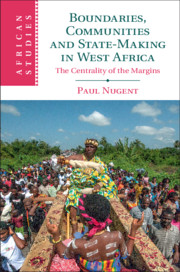Book contents
- Boundaries, Communities and State-Making in West Africa
- African Studies Series
- Boundaries, Communities and State-Making in West Africa
- Copyright page
- Dedication
- Contents
- Figures
- Maps
- Tables
- Acknowledgements
- Abbreviations
- 1 Centring the Margins
- Part I From Frontiers to Boundaries
- Part II States and Taxes, Land and Mobility
- Part III Decolonization and Boundary Closure, c.1939–1969
- Part IV States, Social Contracts and Respacing from Below, c.1970–2010
- Conclusion
- Bibliography
- Index
- African Studies Series
- References
Bibliography
Published online by Cambridge University Press: 08 June 2019
- Boundaries, Communities and State-Making in West Africa
- African Studies Series
- Boundaries, Communities and State-Making in West Africa
- Copyright page
- Dedication
- Contents
- Figures
- Maps
- Tables
- Acknowledgements
- Abbreviations
- 1 Centring the Margins
- Part I From Frontiers to Boundaries
- Part II States and Taxes, Land and Mobility
- Part III Decolonization and Boundary Closure, c.1939–1969
- Part IV States, Social Contracts and Respacing from Below, c.1970–2010
- Conclusion
- Bibliography
- Index
- African Studies Series
- References
- Type
- Chapter
- Information
- Boundaries, Communities and State-Making in West AfricaThe Centrality of the Margins, pp. 545 - 581Publisher: Cambridge University PressPrint publication year: 2019



